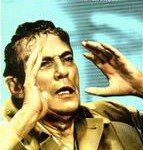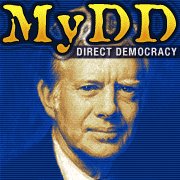In September, 2002, CIA Told Bush No WMD in Iraq
In a revelation which should surprise no one, Sidney Blumenthal informs us in his latest article that Bush knew Saddam had no weapons of mass destruction, but "Bush dismissed as worthless this information" because "Bush wanted to hear what he wanted to hear":
On Sept. 18, 2002, CIA director George Tenet briefed President Bush in the Oval Office on top-secret intelligence that Saddam Hussein did not have weapons of mass destruction, according to two former senior CIA officers. Bush dismissed as worthless this information from the Iraqi foreign minister, a member of Saddam's inner circle, although it turned out to be accurate in every detail. Tenet never brought it up again.
Nor was the intelligence included in the National Intelligence Estimate of October 2002, which stated categorically that Iraq possessed WMD. No one in Congress was aware of the secret intelligence that Saddam had no WMD as the House of Representatives and the Senate voted, a week after the submission of the NIE, on the Authorization for Use of Military Force in Iraq. The information, moreover, was not circulated within the CIA among those agents involved in operations to prove whether Saddam had WMD.
On April 23, 2006, CBS's "60 Minutes" interviewed Tyler Drumheller, the former CIA chief of clandestine operations for Europe, who disclosed that the agency had received documentary intelligence from Naji Sabri, Saddam's foreign minister, that Saddam did not have WMD. "We continued to validate him the whole way through," said Drumheller. "The policy was set. The war in Iraq was coming, and they were looking for intelligence to fit into the policy, to justify the policy."
Now two former senior CIA officers have confirmed Drumheller's account to me and provided the background to the story of how the information that might have stopped the invasion of Iraq was twisted in order to justify it. They described what Tenet said to Bush about the lack of WMD, and how Bush responded, and noted that Tenet never shared Sabri's intelligence with then Secretary of State Colin Powell. According to the former officers, the intelligence was also never shared with the senior military planning the invasion, which required U.S. soldiers to receive medical shots against the ill effects of WMD and to wear protective uniforms in the desert.
...
On the eve of Sabri's appearance at the United Nations in September 2002 to present Saddam's case, the officer in charge of this operation met in New York with a "cutout" who had debriefed Sabri for the CIA. Then the officer flew to Washington, where he met with CIA deputy director John McLaughlin, who was "excited" about the report. Nonetheless, McLaughlin expressed his reservations. He said that Sabri's information was at odds with "our best source." That source was code-named "Curveball," later exposed as a fabricator, con man and former Iraqi taxi driver posing as a chemical engineer.
The next day, Sept. 18, Tenet briefed Bush on Sabri. "Tenet told me he briefed the president personally," said one of the former CIA officers. According to Tenet, Bush's response was to call the information "the same old thing." Bush insisted it was simply what Saddam wanted him to think. "The president had no interest in the intelligence," said the CIA officer. The other officer said, "Bush didn't give a fuck about the intelligence. He had his mind made up."
But the CIA officers working on the Sabri case kept collecting information. "We checked on everything he told us." French intelligence eavesdropped on his telephone conversations and shared them with the CIA. These taps "validated" Sabri's claims, according to one of the CIA officers. The officers brought this material to the attention of the newly formed Iraqi Operations Group within the CIA. But those in charge of the IOG were on a mission to prove that Saddam did have WMD and would not give credit to anything that came from the French. "They kept saying the French were trying to undermine the war," said one of the CIA officers.
The officers continued to insist on the significance of Sabri's information, but one of Tenet's deputies told them, "You haven't figured this out yet. This isn't about intelligence. It's about regime change."
The CIA officers on the case awaited the report they had submitted on Sabri to be circulated back to them, but they never received it. They learned later that a new report had been written. "It was written by someone in the agency, but unclear who or where, it was so tightly controlled. They knew what would please the White House. They knew what the king wanted," one of the officers told me.
...
On Sept. 8, 2006, three Republican senators on the Senate Select Committee on Intelligence -- Orrin Hatch, Saxby Chambliss and Pat Roberts -- signed a letter attempting to counter Drumheller's revelation about Sabri on "60 Minutes": "All of the information about this case so far indicates that the information from this source was that Iraq did have WMD programs." The Republicans also quoted Tenet, who had testified before the committee in July 2006 that Drumheller had "mischaracterized" the intelligence. Still, Drumheller stuck to his guns, telling Reuters, "We have differing interpretations, and I think mine's right."
One of the former senior CIA officers told me that despite the certitude of the three Republican senators, the Senate committee never had the original memo on Sabri. "The committee never got that report," he said. "The material was hidden or lost, and because it was a restricted case, a lot of it was done in hard copy. The whole thing was fogged up, like Curveball."
While one Iraqi source told the CIA that there were no WMD, information that was true but distorted to prove the opposite, another Iraqi source was a fabricator whose lies were eagerly embraced. "The real tragedy is that they had a good source that they misused," said one of the former CIA officers. "The fact is there was nothing there, no threat. But Bush wanted to hear what he wanted to hear."















0 Comments:
Post a Comment
<< Home